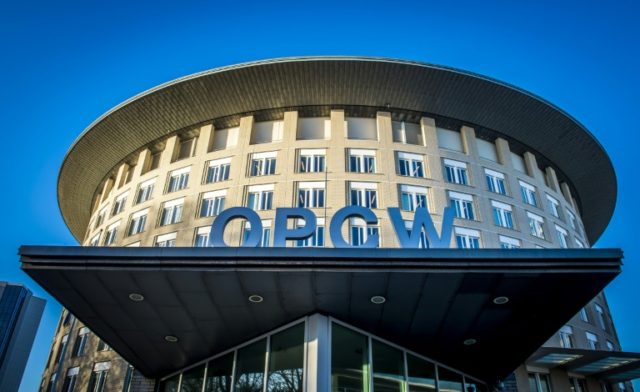The Hague (AFP) – Experts from the world’s chemical weapons watchdog were Monday to hold emergency talks on allegations of a poison gas attack in the Syrian town of Douma.
Here is some background about the Organisation for the Prohibition of Chemical Weapons (OPCW).
– What does it do? –
Founded in 1997, the OPCW based in The Hague oversees the application of The Chemical Weapons Convention (CWC) aimed at eliminating the world’s stockpiles of toxic arms.
Chemical weapons, such as mustard gas, were first used on the battlefields of World War I and also in 1988 by late Iraqi dictator Saddam Hussein against civilians in Halabja, Iraq.
Other incidents include the 1995 subway sarin gas attack in Tokyo by a Japanese cult.
After almost 20 years of negotiations, the convention took effect on April 29, 1997.
The OPCW now has 192 member nations and has overseen the removal and destruction of some 96 percent of the world’s declared chemical weapons stocks of 72,304 metric tons.
Only three nations have not yet signed up to the convention — Egypt, Israel and North Korea. South Sudan said last year it was moving to join.
The United States is on target to destroy its chemical arms — the last remaining major declared stockpiles — within the next few years.
– How does the OPCW work? –
A country that has signed the convention must: declare and destroy all chemical weapons it possesses; destroy all such arms abandoned in another country; and destroy any facilities involved in manufacturing such weapons.
The OPCW monitors the destruction of all declared stockpiles and inspects all former sites where chemical weapons were produced, and suspect sites.
It also seeks to verify credible allegations of chemical weapons use, mostly by sending experts, many of them from ex-military or scientific backgrounds, to the site.
Samples are sent to OPCW-selected labs — as well as its own laboratory in The Hague — for analysis.
The OPCW has carried out some 6,785 inspections at 3,170 chemical weapon-related and 3,615 industrial sites since April 1997.
– Where does Syria fit in? –
After years of denials, the Syrian regime caved to international pressure in September 2013 and joined the OPCW.
It agreed to a deal brokered by the United States and Russia to hand over its toxic stockpile to the OPCW for destruction, averting threatened US air strikes.
The admission came after a sarin gas attack in August 2013 on rebel-held areas near Damascus that was blamed by the West and the opposition on the regime. An estimated 1,000 people died.
The OPCW says 100 percent of Syria’s declared chemical arms — a total of 1,300 metric tonnes — was handed over and destroyed by January 2016.
However, OPCW secretary general Ahmet Uzumcu has repeatedly highlighted what he calls “gaps and inconsistencies” in Syria’s 2013 declaration.
– How does the OPCW work in Syria? –
For the first time in the OPCW’s history, the body is investigating alleged chemical weapons use in a country embroiled in a civil war.
Since being set up in 2014, a fact-finding mission of scientists and experts has deployed “numerous” times to Syria and uses “investigative methods to determine if chemical weapons have been used,” according to the OPCW.
But after an OPCW team hit a home-made roadside bomb in Syria in early 2014, experts were stopped from travelling outside of Damascus for their own safety.
A joint UN-OPCW team, known as the JIM, was set up by the UN Security Council in 2015 to determine “to the greatest extent feasible” who is behind the attacks.
Before its mandate ran out late last year, it found the Syrian military to blame for at least three chemical attacks in villages in 2014 and 2015. And it has said the so-called Islamic State group was behind a 2015 mustard gas attack.
– Are there penalties? –
The OPCW is more of a watchdog than a police force and depends on member states being truthful in their declarations about the size and composition of its toxic arms stockpiles.
It is also not mandated to attribute blame or to determine who unleashed such weapons.
The CWC contains no specific punitive measures for countries that use chemical weapons.
To date, despite condemnation of the use of toxic arms in Syria, no state member has been publicly found to have violated the convention.

COMMENTS
Please let us know if you're having issues with commenting.